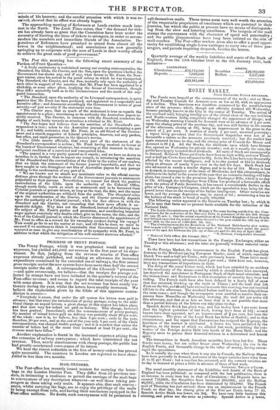PROGRESS OF PENNY POSTAGE.
The Penny Postage, which it was prophesied would not pay its -expenses, has yielded 441,000/. net revenue in the first year of its expe- riment. So that, judging from the revenue returns of Post-office expenses already published, and making an allowance for increased -expenditure occasioned by the extended use of railways, the first annual gross receipts under the new system have been more than half the annual receipts under the old. A correspondent of the Chronicle "presumes" —and quite erroneously, we believe—that the receipts for postage col- lected by stamps have not been included in the quarter's returns of the Post-office revenue; and seems to regard the total receipts of the year with some alarm. It is true that the net revenue has been nearly sta- tionary during the year, whilst the letters have steadily increased. We 'believe the explanation given by the Globe of this apparent contra- diction is correct— "'Everybody is aware, that under the old system few letters were paid in advance ; but that since the introduction of penny postage, owing to the addi- tional charge on unpaid letters, a great change in this respect has taken place, and that now very few indeed are paid on delivery. This change, howeverl has been gradual. Immediately after the commencement of penny postage, the number of inland letters paid on delivery was probably about 20 per cent. of the whole : now it is, we believe, less than 5 per cent.; early in the year, therefore, 20 per cent., and at the end of the year only 5 per cent, of the whole correspondence, was charged double postage : and it is manifest that unless the number of letters had in the mean time increased at least 15 per cent., the revenue must have fallen,"
Another explanation is found in the increased expenses arising from the extension of railway conveyance ; which have oiminished the net revenue. Thus, nearly simultaneous with cheap postage, the public has bad greatly-accelerated conveyance of its letters.
We hear the recent reduction in the fees of money-orders has proved quite successful. The numbers in London are reported to have three- folded in less than two months.


























 Previous page
Previous page